Greetings, guitar enthusiasts, and welcome to another electrifying post on MyGuitarLair.com. Today, we’re strumming our way into a question that’s been buzzing in the minds of many guitarists, both greenhorns and seasoned strummers alike: “Are cheap electric guitars harder to play?” So, grab your picks, tune up those strings, and let’s dive into this sonic mystery.
You can use the table of contents below to take you to the area that interests you. Click on the little box to open it, and then click on the section of the article you want to read, or you can read from start to finish if you want the full guitar-playing experience!
The Short Answer
Cheap electric guitars can be harder to play if they’re not set up correctly or are made with poor-quality materials. However, with a proper setup and practice, even a budget guitar can offer a playing experience equal to or better than more expensive models. A cheap price tag does not necessarily indicate a lower-quality instrument.
Keep On Reading (Below) To Learn More
What Makes A Guitar Cheap?
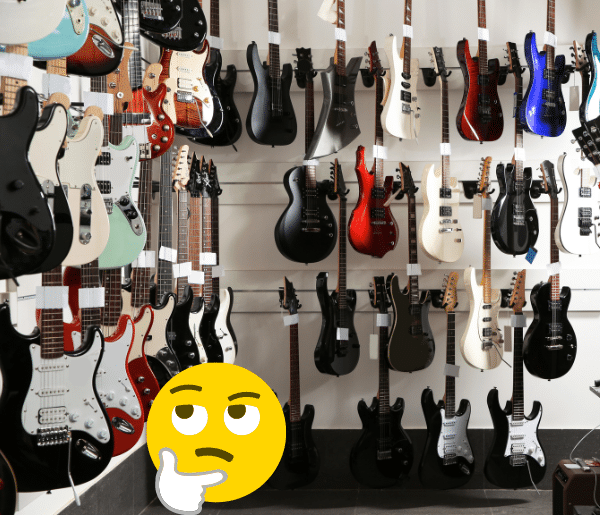
When we refer to a “cheap” electric guitar, we’re discussing its price tag and, to some extent, its quality. The cost of a guitar is determined by a combination of factors, including the materials used, manufacturing processes, brand reputation, and additional features.
Materials
High-end guitars often use premium tonewoods like mahogany, maple, or rosewood, prized for their tonal properties and aesthetic appeal. In contrast, cheaper guitars might use less expensive woods or synthetic materials.
Hardware
Hardware components, such as tuning machines, bridges, and pickups, also vary in quality and price, with cheaper guitars often using lower-quality hardware.
Manufacturing Process
The manufacturing process is another crucial factor. High-end guitars are often handcrafted by skilled luthiers, reflecting hours of meticulous work in their price. Cheaper guitars, however, are usually mass-produced in factories using automated processes, allowing for lower labor costs and faster production times.
Brand Reputation
Brand reputation also influences a guitar’s price. Established brands with a history of producing high-quality instruments, often endorsed by famous musicians, can command higher prices due to their market reputation.
Additional Features
Additional features such as built-in electronics, custom finishes, or special inlays can also add to a guitar’s cost, with cheaper guitars typically having fewer of these extras to keep costs down.
How Does Cost Affect Playability?
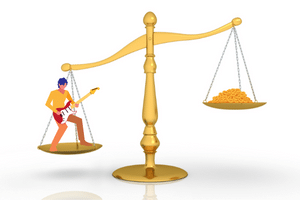
A cheap guitar isn’t necessarily a bad guitar. Many budget-friendly guitars offer excellent value for money, providing a good playing experience for beginners or even more experienced players on a budget. With the right setup and care, a cheap guitar can still be a great instrument for making music.
Cheap electric guitars can be harder to play due to issues like high action (the distance between the strings and the fretboard), poor intonation (tuning inconsistencies across the fretboard), or rough fret edges. These issues can make the guitar uncomfortable or challenging to play.
However, not all cheap guitars suffer from these problems, and many offer excellent value for their price. Some budget-friendly guitars play well right out of the box, and even if you do encounter some of these problems, they can often be fixed with a bit of work.
Making The Most Of A Cheap Electric Guitar

So, you’ve got a budget-friendly electric guitar, and you’re ready to rock the neighborhood. Here are some tips to get the most out of your six-stringed companion:
Get It Set Up
This can’t be emphasized enough. A professional setup can make your guitar easier to play and sound better. It’s like taking your guitar to a wellness retreat where it gets pampered and comes back rejuvenated, ready to rock out with renewed vigor.
A setup will adjust the neck curvature, string action, and intonation and can also fix any rough fret edges. It’s the quickest way to transform a budget guitar from a wallflower to a stage-ready rockstar.
Change The Strings
Fresh strings can make a world of difference in the sound and playability of your guitar.
New strings have a bright, clear tone that can breathe new life into your guitar’s sound. And while you’re at it, try out different types of strings. You might find that you prefer the warm tone of nickel strings or the bright, punchy sound of stainless steel. Experimenting is half the fun!
Practice
This might seem like a no-brainer, but the more you play, the better you’ll get. Even the greatest guitarists in the world started out as beginners. Remember, you’re making progress every time you pick up your guitar.
So whether you’re learning your first chords or mastering the pentatonic scale, keep at it. Practice isn’t just about repetition; it’s about exploration. Try different techniques, play different styles of music, and, most importantly, have fun with it. After all, playing guitar isn’t supposed to be a chore; it’s the best thing in the world!
Upgrade Your Gear
While the guitar itself is important, don’t forget about the other elements of your rig. A good amplifier can make a huge difference in your sound. Even a cheap guitar can sound great through a good amp.
And then there are effects pedals, which can open up a whole new world of sonic possibilities. From the creamy distortion of an overdrive pedal to the psychedelic swirl of a phaser, pedals can add a whole new dimension to your sound.
Take Care Of Your Guitar
A little bit of maintenance can go a long way. Keep your guitar clean, condition the fretboard regularly, and store it properly to keep it sounding its best. It’s like taking care of a classic car; with a bit of love and attention, it can keep running smoothly for years to come.
The Importance Of A Guitar Setup
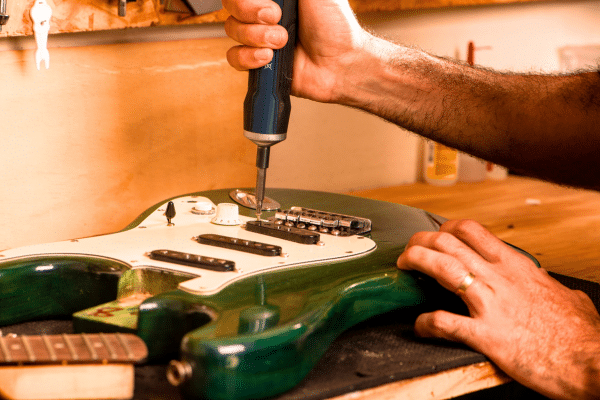
A proper setup can significantly improve the playability of a cheap electric guitar! This process involves adjusting the neck curvature, string action, and intonation to ensure the guitar plays in tune and plays comfortably across the entire fretboard. A well-set-up budget guitar can often outperform a poorly set-up expensive one.
A good setup will also involve checking and fixing any rough fret edges, ensuring the pickups are at the optimal height, and even cleaning and conditioning the fretboard. It’s a full-service treatment for your guitar, ensuring it not only plays well but looks and feels great too.
So, while a cheap electric guitar might come with some challenges, a good setup can often overcome these issues. It’s like taking a rough diamond and polishing it until it shines. And the best part? Even the cheapest guitar can become a joy to play with the right setup.
Setting Up Your Guitar

Here are the key adjustments that can be made to improve the playability of an electric guitar:
| Part of Guitar | Adjustment | Description |
|---|---|---|
| Truss Rod | Adjust Neck Curvature | The truss rod can be adjusted to change the curvature of the neck. If the neck is too straight or too bowed, it can cause fret buzz or high action. Adjust the truss rod by turning it at the headstock – right for less relief (straighter neck), left for more relief (more bowed neck). This is usually best left to a professional. |
| Bridge | Adjust String Action | The bridge can be raised or lowered to adjust the action, which is the distance between the strings and the fretboard. The guitar will be hard to play if the action is too high. If it’s too low, the strings will buzz. Adjust the bridge until the action is comfortable for you. |
| Bridge | Adjust Intonation | The intonation determines whether the guitar plays in tune up and down the neck. If the intonation is off, a note played at the 12th fret will be sharp or flat compared to the open string. Adjust the intonation by moving the saddles on the bridge forward or backward. |
| Nut | Adjust Nut Slots | If the slots in the nut are too high, it can cause high action at the first few frets. If they’re too low, it can cause buzzing. The slots can be filed down to the correct height, but this is a delicate job and might be best left to a professional. |
| Frets | Level and Crown Frets | If the frets are uneven, it can cause buzz or dead spots on the neck. The frets can be leveled and crowned to ensure they’re all the same height and properly rounded. This is a complex job and is usually done by a professional. |
| Pickups | Adjust Pickup Height | The distance between the pickups and the strings can affect the volume and tone of the guitar. If the pickups are too close to the strings, it can cause distortion. If they’re too far away, the sound can be weak. Adjust the pickup height to find the sweet spot. |
| Strings | Change Strings | Old, worn-out strings can sound dull and be hard to play. Changing the strings can give your guitar a fresh, bright tone and improve playability. Try different types of strings to find the ones you like best. |
Remember, while these adjustments can greatly improve the playability of a cheap electric guitar, some of them are quite delicate and can potentially damage the guitar if done incorrectly. If you’re uncomfortable doing these adjustments yourself, taking your guitar to a professional for a setup is always a good idea. See the next section for more information.
Are You Qualified To Make Guitar Adjustments Or Modifications?
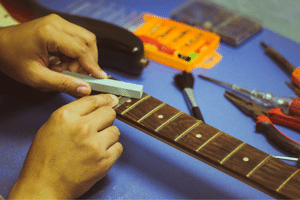
It’s great to work on your guitars, especially if you have a lot of them, but you should always be aware of your limitations.
Adjusting things like an electric guitar’s string height (action) or pickup height can be straightforward. Still, some adjustments require the proper training and experience, like adjusting a guitar’s truss rod.
When you doubt your ability to adjust, repair, or modify your guitar, it’s always best to bring it to a competent guitar technician or luthier (guitar designer & builder). You can permanently damage your guitar, and it might never play and sound right again!
Making modifications to your guitar can void its manufacturer’s warranty and cause permanent damage to the instrument. Certain modifications are irreversible, so you may be stuck with them, even if you desperately want to restore the guitar to its original condition!
I learned that the hard way over the years until I did a three-year apprenticeship in a guitar repair shop. Now I have my own home workshop with the proper training and equipment to safely maintain and repair all my instruments.
Remember: “When In Doubt, Send It Out!”
Don’t Let A Cheap Guitar Hinder Your Progress!

When I first started playing, I was lucky enough to begin on a decent Sears “Silvertone” electric guitar. It was a Fender Jazzmaster body-style copy that played pretty well right out of the box with the factory setup. My father wanted me to use the money to buy stock in Kentucky Fried Chicken instead, but I’m super glad I didn’t!
Embarking on your musical journey with a cheap electric guitar isn’t necessarily a bad thing. However, being aware of potential pitfalls that could hinder your progress is crucial. Cheap guitars often come with issues such as high action, poor intonation, or rough fret edges, making them uncomfortable or challenging to play. This discomfort can slow down your learning process or, worse, discourage you from playing altogether!
I’ve seen players begin on instruments that were nearly impossible to play. Some persevered, while others just gave up.
But don’t let these challenges deter you! Many of these issues can be resolved with a proper setup, transforming a budget guitar into a comfortable and playable instrument. A good setup, which includes adjusting the neck curvature, string action, and intonation, can make even a budget guitar feel like a dream to play.
If your guitar just isn’t cutting it, you don’t have to spend a lot of money to get a good replacement!
Ultimately, the most important thing is to keep playing and practicing. Don’t let the limitations of a cheap electric guitar hinder your progress. Instead, see them as challenges to overcome on your path to becoming a skilled guitarist.
Key Takeaways

Always remember these three points!
- The playability of a guitar is not solely determined by its cost.
- A proper setup can significantly improve a cheap electric guitar’s playability.
- Regular practice is key to improving your skills, regardless of your instrument’s price.
Frequently Asked Questions

Here are some of the questions I get asked about cheap gutars.
If your question does not appear here, please put it in the comments, and I will get right back to you with an answer.
Should My First Guitar Be Expensive?
It depends on how much money you have to spend and how dedicated you will be to learning to play the instrument. A more expensive guitar may continue to play and sound good as you improve as a player.
How Long Do Cheap Guitars Last?
It depends on the guitar’s build quality and how well you care for it. I still have my very first Sears (Japanese copy) electric guitar that I purchased back in the early 1960s; it plays and sounds fine!
How Much Should I Spend On My First Electric Guitar?
This depends on your budget. However, many recommend a budget of around $150 – $300 for a decent quality beginner’s electric guitar. You can get one for under $100 if you’re really not sure if the guitar is the right instrument for you. Look for sales, especially around the holidays.
What Is The Best Cheap Electric Guitar?
There is no one best cheap electric guitar. It depends on your budget and what you’re looking for in playability, sound, and body style. The Fender Squier Series is a great option to consider.
What Should I look For When Buying A Cheap Electric Guitar?
Look for a guitar with a comfortable neck, good intonation, and good build quality. Also, consider the guitar’s sound and how well it plays and stays in tune.
Is It Worth Setting Up A Cheap Guitar?
A proper setup is a good idea for a guitar that does not play well or sound good. If the guitar is in bad condition, consider getting a new one instead.
Do Cheap Guitars Go Out Tune?
Guitars with cheap tuning machines, a poorly slotted nut, and a low-quality bridge may go out of tune. The first thing to do is install a new set of strings and make sure they are correctly wound on the tuning posts. You can always take the instrument to a guitar tech for an evaluation and setup.
Can You Upgrade A Cheap Electric Guitar?
Absolutely! Upgrades like changing the pickups, improving the tuning machines, or replacing the nut can significantly enhance a cheap electric guitar’s performance.
Is Changing The Pickups On A Cheap Guitar Worth It?
It depends on the guitar’s overall value and how bad it sounds. The cost of new pickups won’t really improve the guitar’s playability, and it might not be worth the investment. The first thing you should do is try adjusting the pickup height. Consider trading the guitar in for one that sounds better if that doesn’t correct the problem.
What Are The Cons Of Buying A Cheap Guitar?
Cheaper guitars can use lower-quality materials with poor craftsmanship and have low-grade hardware and electronics. Factory setup, playability, durability, and resale value can also be an issue.
Final Thoughts

I hope you enjoyed this article on “Are Cheap Electric Guitars Harder To Play?” and it helped you decide on an upcoming guitar purchase!
The cost of a guitar is determined by a combination of factors, including the materials used, manufacturing processes and craftsmanship, brand reputation, and the quality of the hardware and electronics.
While cheap electric guitars can be harder to play due to potential issues with their setup or construction, they can still serve as a choice for beginners or those on a budget. With a proper setup and regular practice, you can make the most of a budget electric guitar and enjoy your journey into the world of music.
Despite their low cost, these guitars have the potential to create the same beautiful music as their more expensive counterparts. It’s not the price tag that makes the music; it’s the hands that play it. With passion, practice, and perseverance, even the cheapest guitar can produce the best sounds.
So, don’t let a tight budget stop you from chasing your rockstar dreams. Pick up that guitar, plug in, and let the music take you away!

Here’s a video from Sam Ash that walks you through all the basics of wetting up an electric guitar. If you have a cheap guitar (or any guitar) that doesn’t play or sound right, check it out!
What To Read Next ➡ Why Are Some Guitars Easier To Play? The Truth Revealed!
Tell Me What You Think
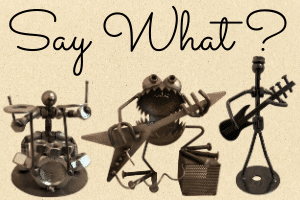
Please leave a comment below if you enjoyed this article, have any questions about cheap electric guitars, or want to give your point of view. I will be happy to help you.
- What was your first electric guitar, and how good was it?
- Which electric guitar do you recommend for beginners?
- What’s the number one thing you do to improve the playability of a cheap guitar?
- What else is on your mind?

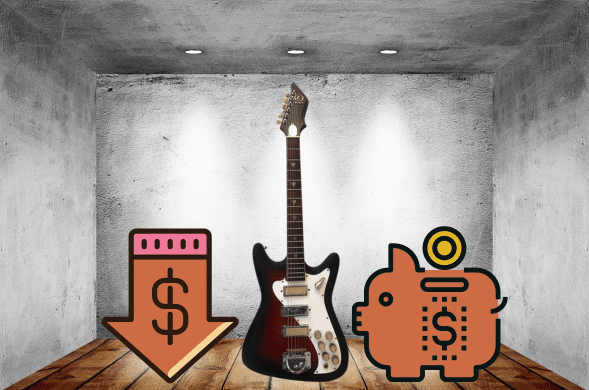

I’ve been playing guitar for about 10 years, and I’ve owned a few different electric guitars. I’ve found that there is some truth to the saying that cheap electric guitars are harder to play.
One of the main reasons for this is that cheap guitars often have higher action. Action is the distance between the strings and the fretboard, and a higher action makes it harder to press down the strings. This can make it difficult to play chords and single notes, and it can also lead to finger pain.
Another reason why cheap guitars can be harder to play is that they often have poor quality components. The necks may be warped, the frets may be uneven, and the pickups may not be very good. This can all make it difficult to get a good sound out of the guitar.
Of course, not all cheap electric guitars are bad. There are some affordable guitars that are well-made and easy to play. However, in general, you’ll get a better playing experience with a more expensive guitar.
If you’re a beginner, I would recommend starting with a cheap guitar. This will allow you to learn the basics of playing guitar without having to spend a lot of money. However, if you’re serious about playing guitar, I would recommend upgrading to a more expensive guitar as soon as you can.
Here are some additional thoughts that I would like to share:
-If you’re considering buying a cheap electric guitar, I would recommend trying it out before you buy it. This will give you a chance to see how it feels and sounds.
-You may also want to consider buying a used guitar. This can be a great way to get a good guitar for a fraction of the price.
Finally, don’t be afraid to ask for help from a professional. A good guitar technician can help you set up your guitar and make sure that it’s playing properly.
(and whoever needs a professional guitar can ask you right?) 🙂
Have a great day.
Arisara
Hi, Arisara
I appreciate your comments!
Yes, it’s true that buying a more expensive used guitar that’s in good condition can be a great idea.
Please let me know if you ever have any questions about buying your next guitar. 😎
Rock On 🤘
Frank 🎸
For all those who intend to buy an instrument and do not have previous experience, choosing a suitable instrument is a very challenging issue. The most important challenge is to buy with good quality and at a cheaper price. Everything is explained very well in this article and it has become easy for those who want to buy an electric guitar. Be sure to read this article.
Thanks for your input, Liam! 😎
I’m thrilled that you like the article!
Rock On! 🤘
Frank 🎸